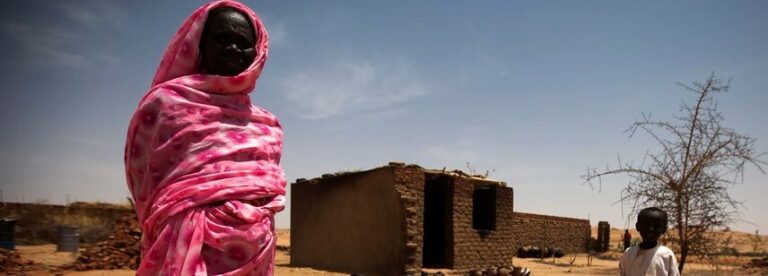A Médecins Sans Frontières (MSF) midwife in Tawila, North Darfur, Sudan, recalls the harrowing story of a girl who was raped repeatedly by her abuser, moments after he ordered his driver to run over her mother. The two had been trying to flee to Tawila from the nearby Zamzam camp, just outside El Fasher, the capital of North Darfur, which the Rapid Support Forces (RSF) and its allies had been besieging and attacking for over a year.
On 13 April, the RSF attacked Zamzam, triggering the displacement of around 380,000 people to Tawila. In just five weeks, more than 300 victims and survivors of sexual violence sought care at MSF-supported services in Tawila.
Days that will never be forgotten
April 2025 is seared into Anna’s* memory. Anna, a midwife with 18 years of MSF experience, was urgently called to the emergency room, where victims of sexual violence were arriving in large numbers following the assault on Zamzam camp.
“There was a smell I will never forget,” says Anna. “The room was filled with women shouting, most of them seeking care after being raped. And in the middle of it all, a girl sat in silence, barely daring to meet my eyes.”
“I asked, ‘What is happening? What is this smell?’ A woman answered, ‘There is a dead body here’”, Anna continues. “It was at that moment that the girl finally lifted her gaze. I asked her, ‘Are you okay?’ And she replied, ‘Will you come with me so we can talk?’”
Ethnic targeting and atrocities faced by civilians
The girl explained to Anna that her abuser first asked if she belonged to the Zaghawa tribe.
“I denied it; the commander kept insisting,” says the girl. “My mother tried to defend me. He ordered his driver to run her over, killing her instantly, right before my eyes. After that, he took me to a place and raped me again and again.”
“It was only when he went after other people that his driver brought me back to my dead mother and the others escaping with us,” the girl continues recounting to Anna. “We placed my mother’s body on a donkey and continued our journey toward Tawila.”
Since the outbreak of war in April 2023, non-Arab ethnic groups, including the Masalit, Zaghawa, and Fur, many of whom survived the violence in Darfur two decades ago, have been particularly targeted. The RSF, which is besieging El Fasher and controls much of the Darfur region, dominates most exit routes from the city, attacking those trying to flee. This includes communities that face rape, torture, and even killings along the way. This situation is detailed in the MSF report Besieged, Attacked, Starved: Mass Atrocities in El Fasher and Zamzam, Sudan, published in early July 2025.
Scaling up care for victims and survivors of sexual violence amid crisis
By the end of June, MSF had reinforced referral pathways through four community-based centres in displacement camps, allowing better engagement with communities. At Tawila hospital, only nine victims/survivors received care between January and March 2025. That number rose sharply to 121 between April and June, and reached 339 in July and August. With strengthened referral systems explaining part of this increase, the numbers indicate improved access to care, but also how widespread sexual violence is.
Many victims and survivors reported brutal assaults by multiple armed perpetrators while attempting to flee. Assaults did not stop with the attack on Zamzam, and every week sees new episodes of violence in and around El Fasher, such as increased bombings and attacks at Abu Shouk displacement camp, and new victims and survivors arriving in Tawila.
Anna has observed a shift in the patterns of sexual violence.
“In April and May, most survivors were women and girls arriving within 72 hours of the attacks,” says Anna. “By August, they came forward later with support from our community centres.”
“Sexual violence against men remains largely unseen,” she continues. “Stigma and fear keep many silent, but there are hints during conversations and consultations when people seek care for other issues, that this is ongoing.”
Urgent needs: Protection, care, and accountability
Despite immense barriers to accessing medical care, over 600 victims and survivors of sexual violence have sought care at MSF-supported health facilities between April and August 2025 in the conflict-ravaged region of North Darfur.
The brutality in Darfur cannot be ignored. It must be documented, and urgent action taken. Humanitarian donors, organisations, and all stakeholders must urgently work to restore and scale up services provided to victims and survivors, and strengthen protection and accountability measures. Civilians must be protected, and perpetrators of sexual violence held accountable.
“Survivors urgently need comprehensive, free, and timely support, including medical care, psychological and social assistance,” says Anna. “Darfur’s survivors face relentless atrocities. The world cannot look away.”
* The name has been changed for security reasons




